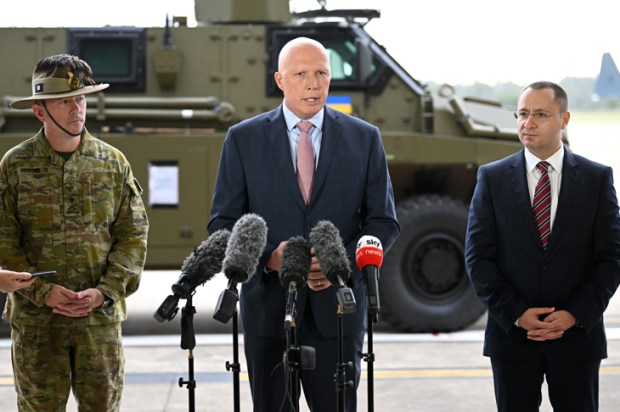Jousting over unicorns was not the most fanciful moment in Canberra this month as the Opposition brings forth one fantastically bad policy after another. After a drought during its Year of Ideas, this is Labor’s Year of Living Dangerously. Not content merely to punish anyone foolish enough to pay for their own retirement, Labor is now threatening those benighted Australians who invest in property. Treasurer Scott Morrison sallied forth like a middle-aged knight in slightly ill-fitting armour declaring Labor was selling the public a unicorn by claiming it could balance the budget by raising taxes on property investors. Unfortunately Morrison muddled his metaphors. Unicorns are billion dollar start-ups, think Uber and Airbnb, and Labor definitely isn’t offering anyone those. If we’re talking animals, Labor’s policy is actually a dog.
Morrison’s shadow then lumbered out with his own wooden riposte about mythical beasts and last week chubby Labor MPs gleefully brandished toy unicorns in parliament, like overgrown schoolboys playing Dungeons and Dragons.
But the joke is on Labor. Shorten imagines he’s a rampant lion fighting the unicorn, or in this case, the PM, for the crown. But it’s not the PM that his roars are alarming, it’s investors, and like the imaginary one-horned horses in nursery rhymes, they won’t just sit around waiting to be mauled. As A.E. Housman warned, ‘The Unicorn is not a Goose, and when they saw the lion loose, they grew increasingly aware, that they had better not be there.’ That’s bad news for homeowners and when they twig that the flight of investors will just push up rents and pull down the value of their homes, it is Labor that will be savaged at the ballot box.
Almost 70 per cent of Australian households own their own homes – one of the highest proportions in the world. For most it’s their most valuable asset. What’s more, of the 1.3 million people with negatively geared properties, two thirds have an income of $80,000 or less. That’s an awful lot of Middle Australia to alienate in an election year. Labor’s policy is driven by the politics of envy. It claims the benefits of negative gearing are ‘skewed to high income earners’ and cites Ben Phillips, formerly of National Centre for Social and Economic Modelling (NATSEM) who says most of the benefits of negative gearing ‘clearly goes to the top 10 per cent, and it’s the same for the capital gains tax, by a very large margin’. What Phillips fails to mention is that ‘the top 10 per cent of working age persons pay 50 per cent of personal income tax’, a claim not from a right-wing warrior but from Phillips himself who Fact Checked then Treasurer Joe Hockey’s statement last July that ‘50 per cent of all income tax in Australia is paid by 10 per cent of the working population’. Phillips was forced to admit that Hockey was right and that the so-called disproportionate benefits only accrue to the top 10 per cent because they pay a disproportionate share of taxes. Labor’s latest reforms have all the hallmarks of their earlier triumphs – revenue that’s as likely to materialise as a heraldic animal combined with economic damage that will be all too real.
Yet the same commentators who hailed the carbon tax as courageous, thought the mining tax a stroke of genius, and couldn’t wait to raise the GST by 50 per cent, are applauding Labor’s latest effort. Like the unicorn in Looking Glass Land who thought children were fabulous monsters until he met Alice, they promise dreamily, ‘If you’ll believe in me, I’ll believe in you.’ Take Stephen Koukoulas, an erstwhile economic adviser to Julia Gillard. He claimed in the Guardian that Labor’s proposal for negative gearing was ‘well founded in fairness and economics’. Yet even Koukoulas was forced to admit that the policy would probably first force up house prices and then create ‘a slump… via the drop off in demand from investors’. All this devastation to raise a mere $30 billion over ten years or on average $3 billion a year. It’s not even 1 per cent of government spending which was projected to be $430 billion this financial year and around 1 per cent of government debt which is nearing $300 billion.
Such a policy is a gift to the government. All it needs to do is explain what Labor is proposing and it will win votes. Yet amazingly, commentators claim it is the government that is ‘exposed’ and praise Labor for having ‘ventured to be bold and brave’ and for taking political risks in the name of ‘long-term structural budget repair’.
Sure it would be preferable for the government to have an economic narrative, but when the opposition is busy shooting itself, first in one foot and then the other, why distract them by announcing a policy? Labor has helped the government in another way. By unashamedly seizing the mantle of being a big taxing party that has no intention of reining in spending, the Opposition is almost forcing the government to do what it should do, which is to be the party of fiscal restraint and low taxes, committed to fostering individual initiative and private enterprise.
Robert Menzies once said, ‘Modern history is… full of examples of great movements that disappeared because they had ceased to have any genuine reason for existence. The important thing is to have a faith to live by, and that goes for us in this party’.
As the government searches for its narrative to take to the election, it needs to return to its Liberal roots and proudly support, not punish, people who work, save and invest. So it should condemn cuts to negative gearing and the capital gains discount and put tax cuts on saving, particularly for retirement, at the centre of a policy that unleashes the power of individuals to build a better life for themselves, using it as a motor of growth for Australia in the 21st century.
Got something to add? Join the discussion and comment below.
Get 10 issues for just $10
Subscribe to The Spectator Australia today for the next 10 magazine issues, plus full online access, for just $10.
Rebecca Weisser is a freelance writer and regular contributor to The Speccie
You might disagree with half of it, but you’ll enjoy reading all of it. Try your first month for free, then just $2 a week for the remainder of your first year.













Comments
Don't miss out
Join the conversation with other Spectator Australia readers. Subscribe to leave a comment.
SUBSCRIBEAlready a subscriber? Log in